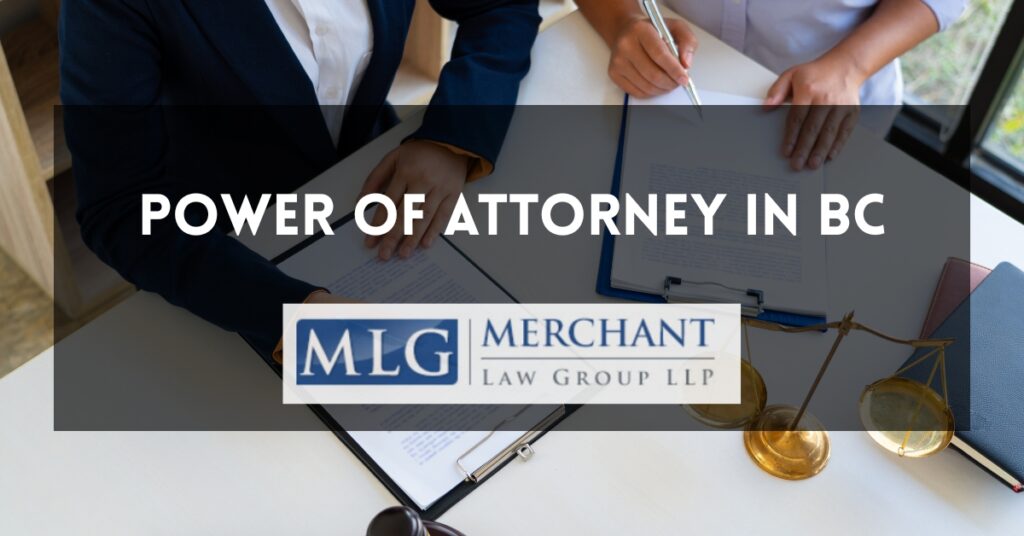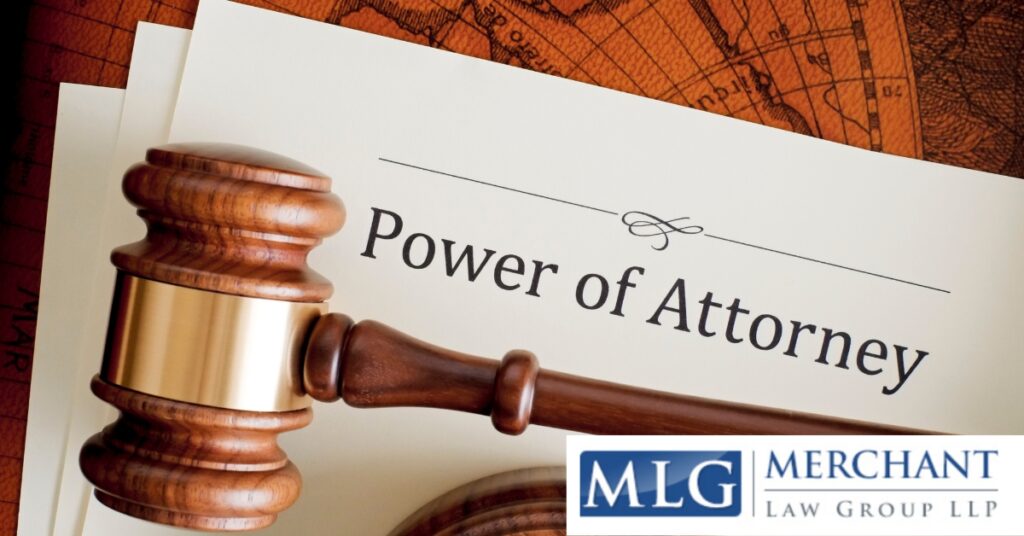Key Takeaways (TL;DR) – Power of Attorney in BC
- A Power of Attorney (PoA) lets someone manage your financial and legal matters if you’re unable to.
- Without a PoA, your loved ones may face court delays, high legal costs, and loss of control over your affairs.
- BC has four types of PoA: General, Limited, Enduring, and Springing – each for different situations.
- Only an Enduring Power of Attorney stays valid if you become mentally incapable.
- PoA doesn’t cover healthcare decisions – for that, you need a separate Representation Agreement.
- You must be 19+ and mentally capable to create or change a PoA.
- Attorneys must act honestly, keep records, avoid conflicts, and follow your instructions.
- A PoA can be revoked at any time, as long as you’re still capable.
- If you don’t have one and lose capacity, the BC Supreme Court may appoint someone (a “committee”) – a costly and stressful process.
- Legal advice helps avoid mistakes like improper signing, vague language, or choosing the wrong attorney.
Need Help? Talk to a BC Wills and Estates lawyer today and protect your future before life throws a curveball.
A Power of Attorney in British Columbia is a crucial legal document that grants someone authority to manage your financial and legal affairs. Without it, your loved ones may face complex court processes if you become incapacitated, potentially losing control over who manages your affairs.
This could lead to significant delays and legal costs, and may result in decisions made by someone you wouldn’t have chosen.
This blog post will explain the Power of Attorney in British Columbia to help you make informed choices.
Protect Your Wishes While You Still Can – Contact Our PoA Experts Now
What is a Power of Attorney in BC?
A power of attorney in BC is a legal document that authorizes someone (your “attorney”) to make financial and legal decisions on your behalf. The Power of Attorney Act governs it and is a vital planning tool to ensure your affairs continue seamlessly.
In British Columbia, a power of attorney strictly covers financial and legal matters, not healthcare decisions. You need a separate legal document called a representation agreement for healthcare and personal care decisions.
The person creating the power of attorney (the “donor” or “grantor”) must be at least 19 years old and mentally capable of understanding the nature and consequences of the document.
How Does Power of Attorney Work in British Columbia?
Once properly executed, a power of attorney allows your chosen attorney to act on your behalf for financial and legal matters. They can sign documents, manage accounts, and handle transactions according to the authority you’ve granted them. This could include paying bills, managing investments, or even selling property.
Legal Authority and Limitations
The attorney’s powers are strictly limited to financial and legal matters specified in the document. They must act in your best interests and follow your instructions.
An attorney cannot make healthcare decisions unless they’re also named in a representation agreement. They must keep proper records of all transactions and avoid conflicts of interest.
Power of Attorney vs Representation Agreement
A power of attorney covers financial and legal decisions, while a representation agreement addresses healthcare and personal care choices.
If you become mentally incapable without an enduring power of attorney, the BC Supreme Court may appoint a committee to manage your affairs, which is a costly and time-consuming process.
What Types of Power of Attorney Exist in BC?
British Columbia recognizes several types of powers of attorney, each serving different purposes and activating under different circumstances to meet specific needs.
1) General Power of Attorney BC
A general power of attorney grants broad authority over financial and legal matters but terminates if you become mentally incapable.
This type works well for temporary situations like travel or short-term incapacity. It gives your attorney authority to manage your legal and financial affairs, including banking, investments, and property transactions.
2) Limited Power of Attorney BC
A limited power of attorney restricts authority to specific tasks, transactions, or time periods, providing precise control over what your attorney can do.
This type is ideal for single transactions like property sales when you can’t be present. The document clearly defines the scope of authority, minimizing potential misuse.
3) Enduring Power of Attorney BC
An enduring power of attorney continues (or “endures”) even if you become mentally incapable, making it essential for long-term planning.
The Power of Attorney Act requires that an enduring power of attorney explicitly states that it continues despite mental incapacity. This type provides a seamless transition of authority if you later become incapacitated.
4) Springing Power of Attorney BC
A springing power of attorney activates only when specific conditions occur, typically when you become mentally incapable, remaining dormant until needed.
This type requires clear triggering conditions, often including medical opinions confirming incapacity and balancing control while you’re capable of protection when needed.
Who Can Be Named as an Attorney in BC?
In BC, an attorney must be an adult (19+) who is trustworthy, financially responsible, and willing to serve. You can appoint individuals, trust companies, or the Public Guardian and Trustee.
Legal Requirements for Attorneys
The attorney must be at least 19 years old and mentally capable. Under the Power of Attorney Act, certain individuals cannot act as attorneys, including paid caregivers or facility employees, unless they’re your child, parent, or spouse.
A person can refuse to act as your attorney, so it’s important to discuss the role with your potential attorney before appointing them.
Duties of a Power of Attorney in BC
- Act honestly and in good faith
- Act in your best interests
- Keep your property separate from their own
- Maintain accurate records of all transactions
- Avoid conflicts of interest
- Exercise reasonable care in decision-making
- Consult with you when possible
- Act within the scope of authority granted
- Not delegate authority unless specifically permitted
How to Get Power of Attorney in BC?
Creating a power of attorney in BC involves determining the type needed, choosing appropriate attorneys, preparing the document, executing it properly, and optionally registering it.
Step 1: Determine the Type of Power of Attorney You Need
Assess your circumstances and goals to select the appropriate type. Consider factors like your age, health status, and whether you need immediate or future protection.
Consulting with a legal professional can help you understand the implications of each type and which best suits your needs.
Step 2: Choose Your Attorney(s)
Select someone trustworthy, financially responsible, and geographically accessible. You can appoint more than one attorney with the same or different authority.
If multiple attorneys have the same authority, they must act unanimously unless your document specifies otherwise, explains how conflicts will be resolved or designate alternates.
Step 3: Prepare the Document
Draft the power of attorney document clearly stating the powers granted, any limitations, and when it takes effect. Include specific instructions about how you want your affairs managed.
While templates are available, seeking legal advice when drafting a power of attorney helps ensure the document meets all legal requirements and truly reflects your wishes.
Step 4: Execute the Document Properly
For an enduring power of attorney, you must sign the document in front of two witnesses (or one if they’re a lawyer or notary public). The witnesses must sign in your presence and each other’s presence.
Your attorney must also sign the document in front of witnesses, accepting their roles and responsibilities.
Step 5: Register the Document
While registration isn’t mandatory, you can register your power of attorney with the BC Land Title Office if it involves real estate transactions.
Provide copies to relevant parties, including your attorney, financial institutions, and other key contacts.
What Makes a Power of Attorney Legal in BC?
A legal power of attorney in BC must be in writing, signed by you while mentally capable, and properly witnessed. It must clearly identify the attorney and specify the powers granted.
Formal Requirements
The document must be written, dated, and signed by you. It must clearly identify the attorney and specify whether it’s a general, limited, enduring, or springing power of attorney.
For an enduring power of attorney, the document must explicitly state that it continues despite your mental incapacity and whether the attorney may exercise authority while you’re capable or only when you become incapable.
Witness Requirements
For standard powers of attorney, one witness is sufficient. For enduring powers of attorney, two witnesses are required unless one witness is a lawyer or notary public.
Certain people cannot be witnesses, including your attorney and the spouse, child, parent, employee, and agent of the attorney.
Notarization and Authentication
While notarization isn’t strictly required for validity in BC, it adds credibility and may be required by certain institutions like banks.
Electronic witnessing is now valid in British Columbia, providing additional flexibility in preparing your power of attorney.
When Should You Create a Power of Attorney?
Create a power of attorney while you’re mentally capable, ideally as part of your estate planning process. Don’t wait until health issues arise, as it may be too late to create a valid document.
Life Events That Trigger POA Creation
Major life changes often prompt power of attorney creation, including:
- Marriage or divorce
- Retirement
- Diagnosis of serious illness
- Military deployment
- Property purchases
- Business ownership
Estate planning milestones, like creating a will, naturally include the power of attorney discussions.
Capacity Requirements
You must understand the nature and effect of the power of attorney when creating it. This includes understanding:
- What property do you have
- The authority you’re granting
- That your attorney must act in your best interests
Mental capacity is assessed at the time of signing, and if capacity is questionable, a medical assessment may be advisable.
Can a Power of Attorney BC Be Changed or Revoked?
Yes, you can change or revoke a power of attorney at any time while mentally capable. Revocation should be done in writing, and all parties holding copies should be notified.
How to Get a Power of Attorney in British Columbia Revoked
To revoke a power of attorney:
- Create a written revocation document clearly stating your intention
- Sign it in front of witnesses following the same formalities as the original document
- Notify your attorney, financial institutions, and anyone else with a copy
- Recover and destroy all copies of the revoked document if possible
When a Power of Attorney Automatically Ends in British Columbia
A power of attorney automatically terminates upon the following:
- Your death
- Your bankruptcy
- Your mental incapacity (unless it’s an enduring power of attorney)
- If your attorney dies, becomes incapable, or resigns
If your attorney is your spouse, the power of attorney may terminate upon separation or divorce unless your document specifies otherwise.
What Are the Costs of Creating a Power of Attorney in British Columbia?
Costs range from minimal for DIY forms to several hundred dollars for lawyer-prepared documents. Registration fees and notarization add additional costs, but professional guidance often prevents costly errors.
DIY vs. Lawyer Fees
DIY kits are less expensive but lack personalized guidance. Lawyer-prepared documents typically cost more but include expert advice tailored to your situation.
The complexity of your affairs affects professional fees. Simple arrangements cost less than complicated situations involving businesses or multiple properties.
Registration and Notary Fees
Land Title Office registration involves additional fees. Notarization typically costs extra depending on the notary public and document complexity.
These additional fees ensure your document is properly executed and recognized by institutions.
What Happens If You Don’t Have a Power of Attorney in BC Canada?
Without a power of attorney, your family must apply to the court for committees if you become incapable. This process is expensive, time-consuming, and removes your choice in who manages your affairs.
Committees Process
The court appoints a “committee” to manage your affairs through a costly and lengthy process. The committee must regularly report to the court and may be required to post a bond.
Family members may disagree about who should serve on a committee, creating conflict during an already difficult time.
Government of BC Power of Attorney and Trustee Involvement
If no suitable committee is available, the Public Guardian and Trustee may be appointed to manage your affairs, charging fees for its services.
The Public Guardian and Trustee follow standardized procedures that may not align with your preferences.
Power of Attorney vs Enduring Power of Attorney BC: Which One Do You Need?
Choose a standard power of attorney for temporary situations while you remain capable. Select an enduring power of attorney if you want protection that continues through incapacity.
| Feature | Standard Power of Attorney | Enduring Power of Attorney |
| Continues if incapacitated | No | Yes |
| Witness requirements | One witness | Two witnesses (or one lawyer/notary) |
| Best for | Temporary absence, specific transactions | Long-term planning, dementia risk |
| Activation | Immediate upon signing | Immediate or can be springing |
| Termination | At incapacity, death, or revocation | At death or revocation |
| Legal requirements | Less formal | More specific requirements |
| Primary purpose | Short-term financial management | Long-term protection |
Standard power of attorney works best for temporary situations like extended travel, short-term medical procedures, or specific transactions like real estate transactions.
Enduring power of attorney is essential for aging adults, those with health concerns, or anyone wanting comprehensive protection that continues if capacity is lost.
Common Mistakes to Avoid When Creating a Temporary Power of Attorney BC
Avoid vague language, inappropriate attorney selection, and improper execution. These mistakes can render your document invalid or create conflicts in its interpretation and implementation.
Legal Drafting Errors
Common drafting errors include:
- Vague language about the attorney’s authority
- Failing to include specific provisions for financial institutions
- Not clearly stating whether it’s an enduring power of attorney
- Omitting important powers or including invalid directions
Execution Problems
Execution problems that can invalidate your document include:
- Improper witnessing
- Failing to have the attorney sign the document
- Not meeting the formal requirements for an enduring power of attorney
- Failing to notify relevant institutions about your power of attorney
Secure Your Financial Future Today – Free Power of Attorney Consultation
Frequently Asked Questions About Power of Attorney BC Meaning
A) Can I have multiple attorneys on my Power of Attorney document in BC, Canada?
Ans: Yes, you can appoint more than one attorney to act jointly (all must agree) or separately (anyone can act). You can also appoint alternates to serve if your primary attorney becomes unavailable.
B) Does a Power of Attorney in British Columbia, Canada, work in other provinces or countries?
Ans: A BC power of attorney may be recognized in other Canadian provinces but might require additional steps for international recognition. Consider creating jurisdiction-specific documents for property in other regions.
C) How does marriage, divorce, or death affect a Power of Attorney in BC?
Ans: Marriage doesn’t automatically revoke a power of attorney. Divorce automatically terminates your spouse’s authority unless your document specifies otherwise. Death immediately terminates all powers of attorney.
D) Can an attorney be held liable for decisions made using a Power of Attorney?
Ans: Yes, attorneys can be held legally responsible for breaching their duties, especially if they act negligently or self-deal. They must keep records and be prepared to account for their actions.
E) Can someone with early dementia still create a valid Power of Attorney?
Ans: Possibly. The test is whether the person understands the nature and effect of the document at the time of signing. Medical assessment documenting capacity at signing can strengthen the document’s validity.






